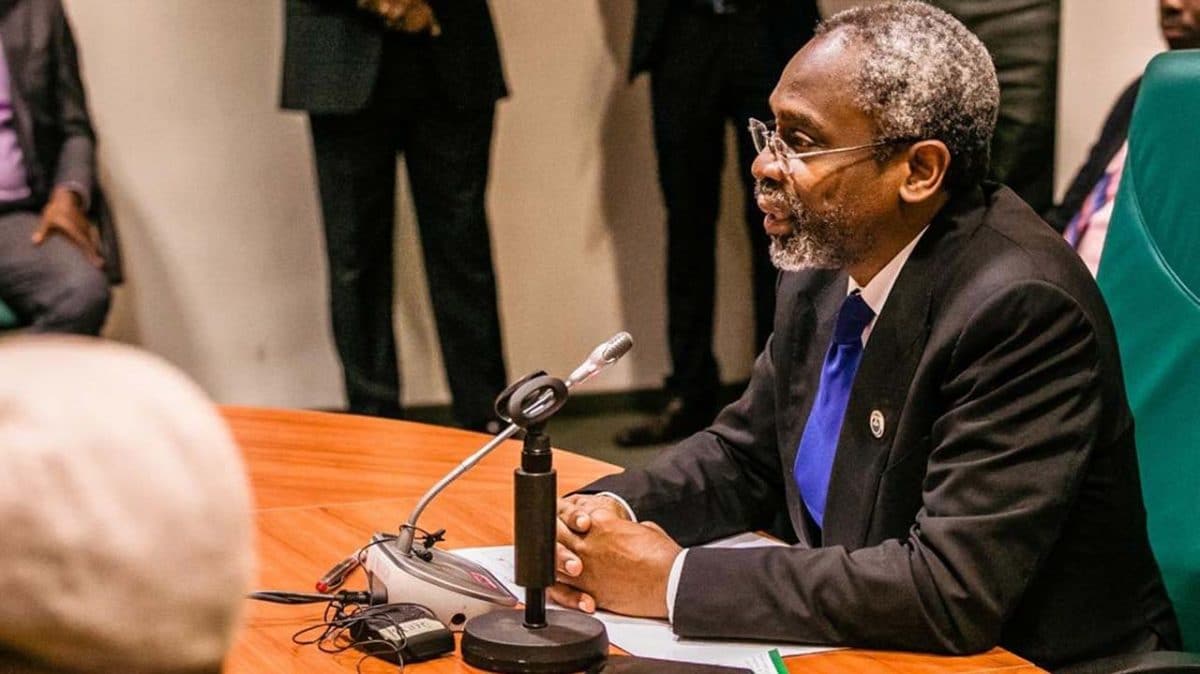
The Speaker of the House of Representatives, Rep. Femi Gbajabiamila on Monday disclosed that only nine per cent of the total budgetary allocation to the Nigerian Armed Forces is spent on equipment.
Gbajabiamila made this known at public hearing on the Armed Forces Support Trust Fund (Establishment) Bill, organised by the House Committee on Defence on Monday in Abuja.
Gbajabiamila said that appropriation records show that about 91 per cent of the current funding of the Armed Forces is spent on recurrent overhead, salaries and welfare.
“This bill seeks to provide an injection of additional capital funding for the Armed Forces of Nigeria at a crucial time in our nation.
“I am sure many of you will wonder why the Armed Forces of Nigeria need an additional financial injection at this time.
“The fact based on appropriation records is that about 91 per cent of the current funding to the Armed Forces go on recurrent overhead, salaries and welfare, leaving only nine per cent for capital purchases.
READ ALSO: Restructure your states before calling for national restructuring, Lawan tells Govs
“This reality has prompted this 9th House of Representatives to seek a way of providing funds that will be focused on the capital needs and training of our Armed Forces,’’ he said.
Gbajabiamila said that the importance of the bill is evidenced by the dwindling resources available to the Armed Forces of Nigeria to prosecute the various security operations it is involved in.
According to him, this requires innovative ideas to raise additional funds without placing any burden on Nigerians, in support of the Nigerian military.
Gbajabiamila said that Nigeria’s expenditure on military hardware and training in the last five years hovers between a paltry nine to 11 percent of budgetary allocation to the Armed Forces.
He said that it is grossly incapable of empowering the military to face the security challenges in the country especially the insurgency in the North East.
Gbajabiamila said that to succeed in the fight against insecurity, the Armed Forces of Nigeria required more funding for modern weapons and required trainings.
He said that spending on military hardware must definitely increase to support the zeal and commitment already being exhibited by the soldiers.
The speaker said the bill is a time-limited endeavour to upgrade the equipment infrastructure of the Armed Forces.
According to him, if Nigeria must develop, we need to get our security estate right by ensuring that our military is adequately equipped and well-trained; this requires funding that cannot be sourced solely through the annual budget provisions.
Gbajabiamila said that during war times, countries do not fund their military through regular appropriation alone as seen in the United States, United Kingdom and all Western powers who engages in extra-budgetary funding.
“Nigeria is at war against insurgency, terrorism, kidnapping and all manner of insecurity; hence the need to uplift the resources available to our armed services to enable them to procure the best tools to help win this war.
“So, what we seek to do in this bill is not new or unique to us as a nation; the solution to our security challenges requires asymmetric actions across many policy areas. This is what we have tried to do as the representatives of the people.
“The concept of a trust fund already exists for the Nigerian Police; it only makes sense to also bolster our military capability as well through this unique vehicle,’’ he said.
In his remarks, Chairman, House, House Committee on Defence, Rep. Benson Babajimi (APC-Lagos) said that the bill seeks to explore alternative sources of funding for the armed forces.
He said that the need to create additional funding for military has become apparent giving the myriad of security challenges facing the country.
According to him, only approximately nine per cent of the annual budgetary allocation is available for capital expenditure in the military; a large chunk goes for recurrent expenditure.
READ ALSO: State of the Nation: We’ve failed our children – Finance Minister
The rep said that the Nigerian armed forces had continued to expand and there was need to provide adequate weaponry and equipment to sustain the ever-increasing operations.
Babajimi said that efforts in the past to meet the required weapons to adequately combat insecurity had met brick wall due to insufficient funds.
He said that Nigeria ranked very low in terms of defence spending and that develop countries like the U. S. , Russia, United Kingdom, Poland all have alternative sources of funding for defence.
The lawmaker said that Nigeria spends $2.6 billion rank fourth in Africa after Algeria, Morroco and South Africa which spend $9.7 billion, $4.8 billion and $3.1 billion respectively.
He said given the security challenges facing the country today, the fund seeks to ensure a robust, efficient, well-trained and equipped armed forces.
The chairman said that the house will stop at nothing to ensure that the Nigerians are safe and their properties secured across the country.
Dr Charles Omole, the Special Assistant to the Speaker on National Security and Intelligence, said that bill is not placing extra responsibility on the citizens or taxes on businesses in the country.
He explained that the revenue for the fund will be sourced from statutory deductions as well as voluntary donations for individuals or organisations.
Omole said that the bill expressly states that the funds will only be spent on equipment and special trainings for military personnel.
He said that the bill provides that the fund is expected to last for five years and is subject to renewal if deemed fit by the National Assembly.
Omole said that the bill puts a duty on the fund to ensure, as much as possible, the use of locally manufactured defence equipment and also create room for importation.
He said that the bill provides for proper oversight of the fund by the National Assembly and the Office of the Auditor General of the Federation.

